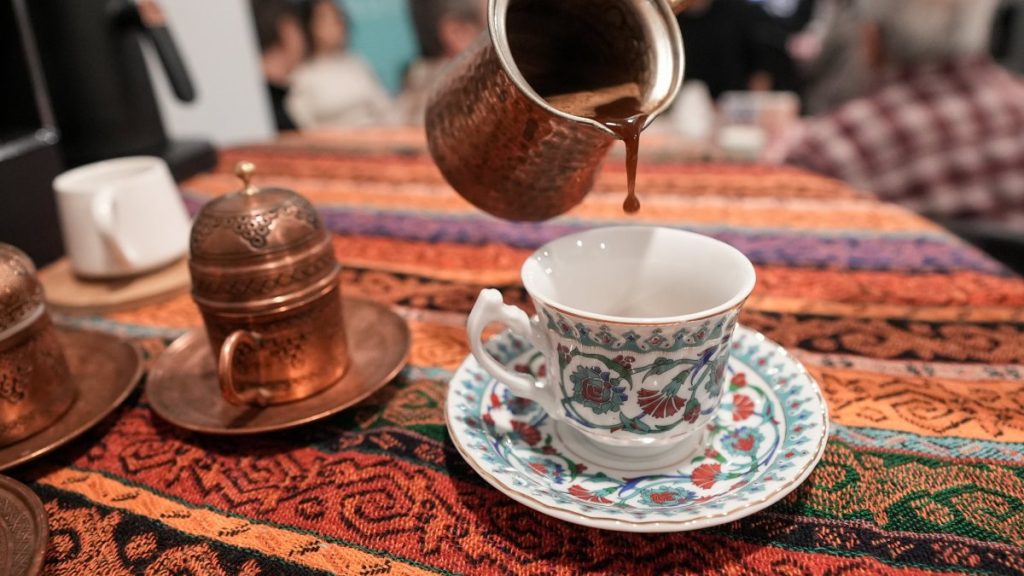On Thursday, the rich tradition of Turkish coffee was celebrated worldwide in various events, highlighting its cultural significance while also promoting Türkiye’s heritage. From the United States to the Asia-Pacific region, the day was marked with numerous activities showcasing the deep cultural roots of this iconic beverage.
Turkish coffee, recognized for its unique preparation and rich taste, was inscribed on the UNESCO Intangible Cultural Heritage List in 2013, and since then, Dec. 5 has been officially recognized as “World Turkish Coffee Day.”
In Washington, D.C., the Turkish Embassy hosted a grand celebration at the residence of Ambassador Sedat Önal, with a performance by Turkish harpist Şirin Pancaroğlu. A large number of diplomats, local dignitaries and cultural enthusiasts attended the event, where guests enjoyed the authentic flavors of Turkish coffee in a festive atmosphere.
The celebration in New York City took place at the Turkish House (Türkevi) building, home to the Turkish Consulate General and the Permanent Mission of Türkiye to the United Nations. The event was attended by prominent figures, including New York Consul General Ambassador Muhittin Ahmet Yazal, along with several United Nations diplomats, journalists and members of civil society organizations. Guests at the event enjoyed various types of Turkish coffee, including classic Turkish coffee, Dibek coffee and Mardin coffee, paired with traditional Turkish delights.
In a notable development, U.S. Rep. Don Beyer of Virginia formally introduced a statement to the U.S. Congress recognizing Dec. 5 as World Turkish Coffee Day. In his statement, Beyer highlighted the significance of Turkish coffee, noting its place on UNESCO’s list of Intangible Cultural Heritage and emphasizing its cultural importance across generations and borders.
This move marks an important milestone for Turkish coffee in the U.S., a country with one of the world’s largest coffee consumption rates. Beyer’s endorsement brings further recognition to Turkish coffee as an enduring tradition in American society.
In Brussels, the Permanent Mission of Türkiye to the European Union organized an event in collaboration with the Yunus Emre Institute (YEE), where guests could experience Turkish coffee prepared using both traditional sand-roasting methods and modern machines. Ambassador Faruk Kaymakcı expressed his excitement about raising awareness of Turkish coffee in the heart of the EU. “We aim to increase awareness of Turkish coffee here in Brussels and strengthen this tradition in the years to come,” he said.
The event attracted many curious attendees, including Genevieve Norris, who praised the coffee’s strong taste despite its small serving size, and Imogen Allan, who appreciated the natural aroma of Turkish coffee compared to French and Italian brews.
Celebrations also extended to several Balkan countries, including North Macedonia, Kosovo and Albania, where local Turkish coffee-related events were organized by the YEE. In Skopje, the Turkish Embassy hosted a reception at its residence, attended by a large group of guests. Additionally, similar events took place in Kosovo’s Pristina, Prizren and Peja, as well as in Albania’s Shkodër.
In Pakistan, state broadcaster PTV aired a special program to mark World Turkish Coffee Day, attended by officials, diplomats and media personnel. The event was organized by the Turkish Embassy in Islamabad and the YEE. Turkish Ambassador to Pakistan, Irfan Neziroğlu, emphasized the strong cultural significance of Turkish coffee in Turkish culture.
The Turkish Embassy in Cairo also hosted a reception, offering Turkish coffee, börek (savory pastry) and Turkish delight to around 50 high-ranking Egyptian officials and diplomats. The event featured performances by Suzan Sabır, the principal viola player of the Cairo Symphony Orchestra, who performed pieces from Ottoman Turkish music.
Other countries, including Canada, Morocco, Italy, Qatar, Poland and Bulgaria also held similar events to celebrate the cultural importance of Turkish coffee.


